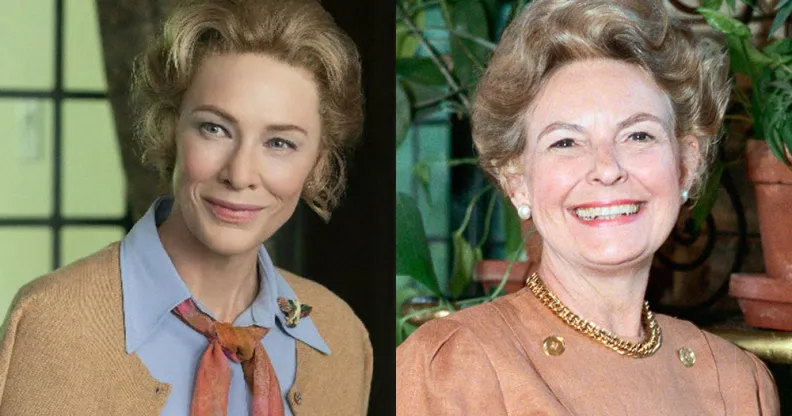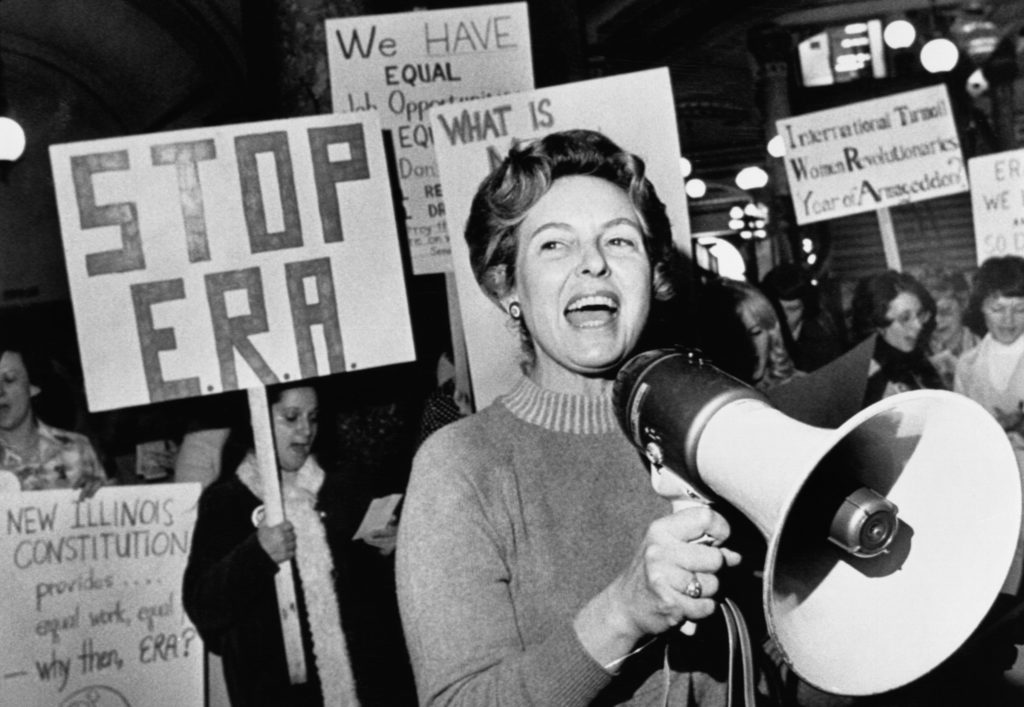The fascinating true story behind Mrs America, the new Cate Blanchett series about the conservative who fought against equality – and won

Cate Blanchett plays Phyllis Schlafly in Mrs America. (Hulu/Getty)
Mrs America is Cate Blanchett’s new Hulu series about Phyllis Schlafly, the conservative who became notorious in the ’70s for her fight against the Equal Rights Amendment.
Phyllis Schlafly is a divisive figure in American history for her campaign against equality the Equal Rights Amendment, which if passed could have introduced gender equality to the American workplace.
Mrs America retells her story, with Cate Blanchett playing Schlafly and serving as producer on the FX on Hulu miniseries.
Speaking before its release on Wednesday (April 15), Blanchett noted how poignant it is that the series arrives as the coronavirus pandemic highlights the failings of the US labour market.
The actor said that during the 1970s, when Mrs America is set, “systems hadn’t shifted profoundly enough to serve all of the American citizens. I think that what we’re dealing with now in 2020 is still a very unequal system”.
The “unequal system” is, as the new Hulu series recounts, one that Schlafly devoted herself to preserving.
Who was Phyllis Schlafly?
The real-life Mrs America believed a woman’s place was in the home, and became notorious across the US in the 1970s for her campaign against the Equal Rights Amendment.
She argued that the proposed amendment, which would have enshrined gender equality in the American constitution, undermined “privileges” including laws guaranteeing women alimony payments and exempting them from subscription to the armed forces.
“I simply didn’t believe we needed a constitutional amendment to protect women’s rights,” Schlafly told The New York Times in 2006.
“I knew of only one law that was discriminatory toward women, a law in North Dakota stipulating that a wife had to have her husband’s permission to make wine.”
Among Schlafly’s greatest fears about the ERA was that it would make abortion a constitutional right, and would “generally implement the ‘gay rights’ and lesbian agenda”, making marriage equality the law of the land.
‘Mrs America’ was a leading voice for American conservatives.
Having become a powerful voice in the conservative movement in the 1950s, Schlafly became something of a household name in the 1960s with her self-published book A Choice Not an Echo.
The book rallied against what she described as the “Eastern Establishment” which controlled the Republican Party.
It was successful in its mission of winning the party’s presidential nomination for the right-wing Barry Goldwater. Ultimately he lost to the incumbent Lyndon B. Johnson, but his campaign and Schlafly’s support planted the seed for a larger conservative resurgence that would culminate in the election of Ronald Reagan.
In 1972 Schlafly founded Stop ERA, the “pro-family” campaign group now known as the Eagle Forum. Its original name was an acronym for Stop Taking Our Privileges.

Phyllis Schafly leads a Stop ERA protest. (Getty/Bettmann Archive)
Stop ERA fought against the Equal Rights Amendment.
The ERA had first been proposed by the National Woman’s party in 1923, and was revived in the late ’60s by house representative Bella Abzug and feminists Betty Friedan and Gloria Steinem.
By 1972, the amendment had been approved by both chambers of congress and was submitted to state legislatures to approve. Within about a year, the act had won the approval of 30 states, putting it within sight of the 38 required.
Schlafly reacted quickly, having her volunteer army lobby lawmakers while armed with homemade breads or pies, a symbol of the traditional homemaking she claimed to be defending.
Meanwhile Schlafly debated feminists such as Friedan, who called her an “Aunt Tom” and once told her: “I’d like to burn you at the stake. I consider you a traitor to your sex.”
She would often start her speeches by thanking her husband John Fred Schlafly, a wealthy lawyer who she married in 1949 aged 25.
“I want to thank my husband, Fred, for letting me come here,” she would say, something she admitted she liked to use “because I know it irritates women’s libbers more than anything else”.
The Equal Rights Amendment failed in 1982.
Schlafly and Stop ERA’s efforts proved successful, and by the 1979 deadline the amendment was three states short of the number needed for approval. The deadline was extended, but eventually the amendment fell flat in 1982, still three states shy of its goal.
Schlafly celebrated by hosting a party at Washington’s Shoreham Hotel, where she told reporters that the ERA was “dead for now and forever in this century”.
Instead, she said, the US could enter “a new era of harmony between women and men”.
After her success, Schlafly remained a prominent conservative voice. Throughout her life she authored or co-author more than 25 books, hosted a radio show, obtained a law degree and passed the Illinois bar in 1978.
Despite her many achievements, Schlafly considered her work “a hobby”, rather than a career.
Her focus, she said, was on her six children, who she boasted had each been breast-fed and home-schooled until the age of 7, without the assistance of a nanny (though she did employ a full-time housekeeper).
Phyllis Schlafly wasn’t anti-gay, according to her gay son.
He son John Schlafly was outed as gay in 1992 by the New York LGBT+ publication QW. He defended his mother’s movement to The LA Times, saying: “These people are not anti-gay. They’re not gay bashers.
“I hold my mother in very high esteem. She’s doing good work.”
In 2010, she defended her position on marriage equality by saying: “Nobody’s stopping them from shacking up. The problem is that they are trying to make us respect them, and that’s an interference with what we believe.”
In her final months, Schlafly endorsed Donald Trump for president, devoting her energies to a final book The Conservative Case for Trump, which was published on September 6, 2016, the day after her death.
She was survived by her children, 16 grandchildren and three great-grandchildren, her husband having passed away in 1993.

